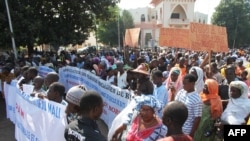PENTAGON —
Pentagon officials on Tuesday neither confirmed nor denied reports that secret talks are under way between the United States and France on plans to bring northern Mali back under the control of the country's central government.
U.S. efforts to wrest control of much of northern Mali from Islamist militants have centered on enabling Washington’s partners in the region to win back control of the territory - and not by sending in U.S. troops to do the job.
News reports this week say France is sending in drones, or unmanned aerial vehicles, to do surveillance missions - something Pentagon officials say the United States has been doing for several months.
Their targets are militants, including some with the al-Qaida in the Islamic Maghreb group, who have taken over large areas of northern Mali and sparked violence that U.S. officials are concerned might spread to other countries.
Thomas Dempsey, an analyst with the U.S. Defense Department’s Africa Center for Strategic Studies, says the violence has been partly a result of turmoil in Libya earlier this year.
“There have been several rebellions in the north and that all came to a head earlier this spring, partly because of large numbers of former fighters from the Moammar Gadhafi regime in Libya returning to northern Mali and bringing with them significant numbers of arms,” Dempsay said.
Complicating efforts to regain control of the north is a humanitarian crisis brought on by a drought, and political turmoil in the capital, Bamako, in the south. Mali’s weak central government is under the control of a group of junior military officers who led a coup in March that prompted the United States to suspend direct military cooperation.
Dempsey says that for now, sending drones in to obtain intelligence and sharing it with partners on the ground is the best approach.
“It is an incredibly remote part of Africa with very, very poor infrastructure, very poor road nets. Simply knowing what is happening on the ground is very, very difficult. And remotely piloted vehicles can be of great help in that regard,” Dempsay said.
The United States and its international partners say that if there is any outside military intervention in Mali, it should be undertaken by troops from other African countries.
U.S. efforts to wrest control of much of northern Mali from Islamist militants have centered on enabling Washington’s partners in the region to win back control of the territory - and not by sending in U.S. troops to do the job.
News reports this week say France is sending in drones, or unmanned aerial vehicles, to do surveillance missions - something Pentagon officials say the United States has been doing for several months.
Their targets are militants, including some with the al-Qaida in the Islamic Maghreb group, who have taken over large areas of northern Mali and sparked violence that U.S. officials are concerned might spread to other countries.
Thomas Dempsey, an analyst with the U.S. Defense Department’s Africa Center for Strategic Studies, says the violence has been partly a result of turmoil in Libya earlier this year.
“There have been several rebellions in the north and that all came to a head earlier this spring, partly because of large numbers of former fighters from the Moammar Gadhafi regime in Libya returning to northern Mali and bringing with them significant numbers of arms,” Dempsay said.
Complicating efforts to regain control of the north is a humanitarian crisis brought on by a drought, and political turmoil in the capital, Bamako, in the south. Mali’s weak central government is under the control of a group of junior military officers who led a coup in March that prompted the United States to suspend direct military cooperation.
Dempsey says that for now, sending drones in to obtain intelligence and sharing it with partners on the ground is the best approach.
“It is an incredibly remote part of Africa with very, very poor infrastructure, very poor road nets. Simply knowing what is happening on the ground is very, very difficult. And remotely piloted vehicles can be of great help in that regard,” Dempsay said.
The United States and its international partners say that if there is any outside military intervention in Mali, it should be undertaken by troops from other African countries.










